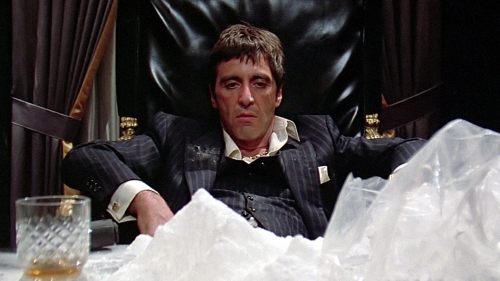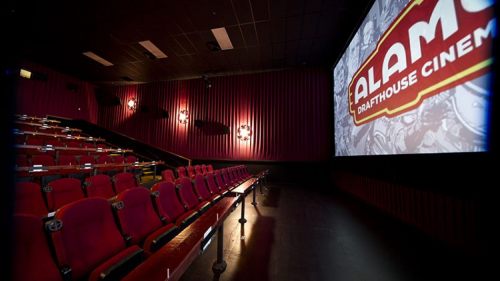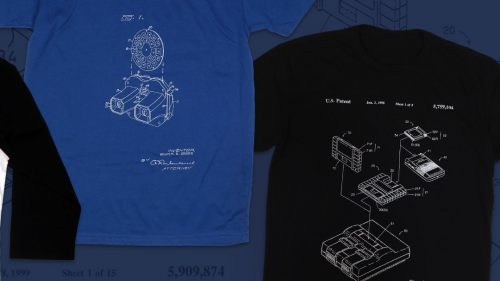Full Roar Pacino: Karina Longworth Dissects Tony Montana and SCARFACE
This weekend Scarface plays at the Alamo Drafthouse Slaughter Lane; it's part of our Summer of 83 series, and the film will be playing at Drafthouses across the country in the coming weeks (click here to see the schedule!). Since film critic Karina Longworth recently wrote a book for Cahiers du Cinema examining the career of Al Pacino, I reached out to get some insight into Pacino, his over-the-top performance in the movie, and his entire career. We conducted this interview via email.
I can't recommend Al Pacino: Anatomy of an Actor enough (also great: any of the books in the Anatomy of an Actor series), and you can buy it through Badass Digest at the Amazon link at the bottom of the article. Or by clicking here, if you don't have the patience to scroll down!
Over the years Al Pacino's Scarface performance has gotten a reputation as operatically over the top. Is there a tongue in cheek element to his approach to Tony Montana?
I don't think tongue in cheek is the right way to describe it, because that implies that Pacino was winking at the audience, and I don't think he was doing so intentionally. However, he did claim that he was trying to do something "Brechtian" with the film (which was a passion project that he instigated, it wasn't just something he was cast in), and while that could mean a lot of things, I take it to mean that a) he was experimenting in applying the techniques and mindset of theater acting to film, and b) he was intentionally creating a character that was a larger than life symbol rather than a traditional point of identification for the viewer. In my book, I talk about the phrase "over the top" as being crucial to understanding what he was trying to do. In talking about Tony Montana, Pacino has often repeated the quote, "man's reach should extend his grasp, or what's Heaven for?" To him, the whole point of making the movie was to dramatize an exhilarating but ultimately doomed impulse to overreach, to go too far, and on those terms, the bigness of the performance is perfectly suited to what he felt was the essence of the story and the character.
There's a sense that Pacino's career has two halves - one where he's doing more serious, quieter roles and one where he's going very big. Is that a misrepresentation? If not, what do you think changed in Pacino's style?
I think that's both accurate and not. There's "bigness" in even his very early roles: Scarecrow, for instance, builds to a scene in which Pacino's character has a spectacular breakdown, and it plays as the result of the repression that caused him to be "quiet" for much of the film. And certainly, Serpico and Dog Day Afternoon and Godfather II include elements of the Full Roar Pacino. I think what separates these early films from many of his performances of the 90s and beyond is a sense of control and intentionality,that both the loud and the quiet elements are always tied to the emotional truth of the character and the scene. Scarface was the first time Pacino experimented with a screen performance that was intentionally not psychological or about physically manifesting an internal truth that the viewer could relate to, that was all about external action, and so in some sense you could call that a turning point.
But if I think if there's a real dividing line, it comes after Pacino wins the Oscar for Scent of a Woman. When I saw that movie when it first came out, and I was, like, 12 years old, I thought that was great acting. When I watched it again to write the book, I was a little baffled by it. He makes certain choices that are just patently absurd, that have absolutely nothing to do with mirroring any sort of reality. That THIS was the performance that earned him the ultimate show of respect from his peers -- and not any of the Godfather films, which taken together, I think, still hold up as maybe the best male screen acting of the century? It almost seems like it flipped a switch in him, where after he got that validation he was like, "Oh, so this is what you guys like? Oooookkkaaaaay..."
Why does Scarface in particular appeal so much to rappers?
That's an interesting phenomena, and not one that I'm particularly expert in, but I think it speaks to both the film's success as a work of fantasy, and its failure as social critique. It's a film that pretty blatantly tries to equate unchecked capitalism to terrorism, and yet, you don't walk out of Scarface thinking that accumulation itself is a bad thing. Instead, the film works as an operatic celebration of class-passing. So maybe that has something to do with it. Or maybe it's just the catchphrases.
Pacino's Cuban accent: how bad is it?
Pacino did hang out with actual Cuban people to "perfect" the dialect, but this is another case where it's important to remember that he was consciously trying to create not a credible real-life guy, but a two-dimensional cipher that the audience could have some kind of distance from. Maybe this relates to your previous question: it is interesting that Tony Montana has been adopted as a kind of fantasy role model, given that Pacino himself has stopped just short of calling him a cartoon.
How did you choose the films to focus on in Al Pacino: Anatomy of An Actor? Was there a film in his filmography that surprised you when you revisited it?
I wanted to try to tell the story of both Pacino's career, and the evolution of Hollywood filmmaking, as an art and as a business, over the course of a pretty dynamic 40 years. The Godfather films were, to me, the obvious place to start because they're the defining achievement of both his career and of their Hollywood era; Jack and Jill was the obvious place the end, because -- however sadly -- it's emblematic of both the state of Pacino's film career circa now, and of a certain kind of contemporary Hollywood thinking. Everything in between was chosen because it allowed me to talk about a specific facet of Pacino's work or persona, or to describe a unique stage in his career.
I mentioned above that I was surprised by Scent of a Woman, although not pleasantly, and I had never seen ...And Justice For All, which became one of my favorites. But I think the biggest discovery for me was a film which didn't end up making it into the book: Revolution. This movie was a huge disaster for Pacino, and its failure, in combination with Scarface's, compelled him to go on hiatus from movies for the second half of the 80s. The version that was theatrically released is, as far as I can tell, not in any way available (if anyone is reading this and knows where to source a print, we should talk). The only thing I've been able to see is Revolution Revisited, which came out on DVD a couple of years ago. Basically, director Hugh Hudson got 70-something Pacino to record a new voice-over for the whole film, acting as the internal monologue of his 30-something character. It's kind of awful, but also kind of amazing. The film itself is a Revolutionary War epic with incredible, period production design, shot with handheld cameras and performed naturalistically. I'm not sure it's good, but I sort of love it, and I'm dying to see the sans-VO version.
What's Pacino's most underrated performance?
Scarecrow is perennially under-seen/under-valued. There is a new restoration of it, which I hope changes that somewhat. I think Sea of Love is really worth a look, especially the first half of the film, when it's a midlife-masculinity crisis movie, before it becomes a cheesy erotic thriller. Also, after revisiting the Godfather trilogy several times in writing this book, I'm not sure it's possible to rate his Michael Corleone highly enough.
Jack and Jill: Can it be defended?
It is possible -- I mount a measured defense of it in my book. On the whole, the movie is awful, but I think the Pacino-as-"Pacino" parts are legitimately funny, and it's really crucial to a conversation about Pacino as a kind of cultural idea, and particularly in this state of his career. His willingness to do it suggests a combined bravery and blindness that's fascinating. It's "Fuck it, I've been accused of self-parody for so long that I might as well literally parody myself," and yet, he doesn't seem to understand that doing this in a tacky, bottom-of-the-barrel Adam Sandler comedy was the least cool, least savvy way of proving that he has a sense of humor about himself. I'm not going to advocate that anyone actually watch it, but I had fun writing about it.



